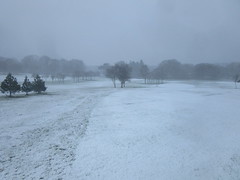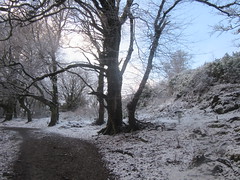Eighteen years ago today, a violent storm struck the Outer Hebrides. Gusts reached 134 mph or 216 km/h at Castlebay, and 100 mph or 160 km/h in Stornoway. As darkness fell, after 4 o'clock, hapless pedestrians in the centre of Stornoway struggled to make headway along the streets, but some hostelries would not open their doors to them. If memory serves, one or two people sustained injuries.
At the time, I was staying in Cearsiadar, a hamlet 10 miles south of Stornoway as the gull flies, 22 miles by road. The power went off at 6.20pm, and did not come back on for 48 hours. At Sildenis, a few miles west of Ciarsiadar, the electricity remained offline for six days. I watched across Loch Erisort, hidden in the darkness, as flashing blue lights emerged on the main Stornoway to Tarbert road. A busdriver, heading for the district of South Lochs, reported a sheep flying past his windscreen at Laxay. The police thereupon closed the road. The night was filled with the sound of the wind roaring, although the silence on the radiowaves was deafening and scary. Only the signal of BBC Radio Scotland on 810 kHz, mediumwave, continued. The island based transmitters all went offline because electricity pylons, feeding power from Harris north to Lewis, were blown down like so many matchsticks. Even the main site at Eitsal, outside the village of Achmore, was not functioning. Roofs were blown off buildings, a line of trees in Balallan was flattened. Trees in the Lews Castle Grounds at Stornoway fell down, some blocking the main road into town from the south. For many days afterwards, the Grounds had to be closed to walkers out of concern for their safety.
A lot of damage, a lot of inconvenience. When I was finally able to travel into town on the 13th, people were relieved, as it could have been so much worse. Well, it actually was worse than damage and inconvenience.
Word began to seep out of the Southern Isles that five members of one family had been reported missing the morning after the storm. They had set off from their home in Lionacuidhe, South Uist, for Benbecula. They fled in terror at the wind, the pebbles being hurled against the windows and walls and the fearing encroachment by the sea nearby. I know the road they travelled, I drove down it one July evening four years later. The road runs parallel to the South Ford, which separates South Uist and Benbecula. To the south lies the large inland Loch Bì. That night, the stormforce winds blew the waters of the loch northwards, until they met the outflow under the road linking Lionacuidhe and Iochdar. It is only a narrow culvert, and the loch is large. The road runs on eastwards until it meets the main spinal route through Uist, the A865, which crosses the South Ford via a causeway, a solid barrier with only a few culverts to allow the flowing of the tides. That night, the tide rose through the channel and met the barrier, and combined with the flood from Loch Bì to cause a stormsurge which swept across the road from Lionacuidhe. It swept away the two cars carrying the family of five, a grandfather, his daughter and son-in-law, and the younger couple's young children. They were all eventually found on the shores of the South Ford, their lives claimed by the storm.
In my 18 years in the Outer Hebrides, I have experienced many gales and storms. The storm of January 11th, 2005, remains vivid in my memory, haunted by the images of the two young children as they smile out of the BBC news item that reported their demise. I cannot bear to post the actual images in this blogpost.








